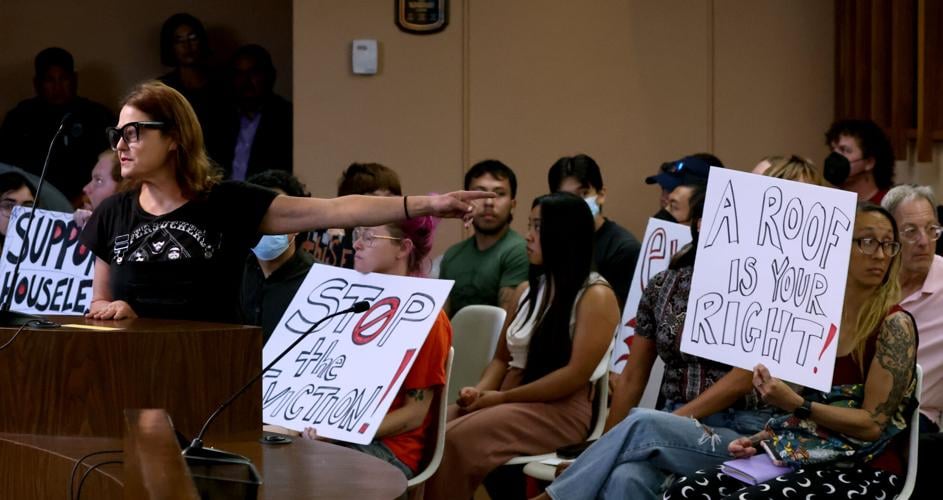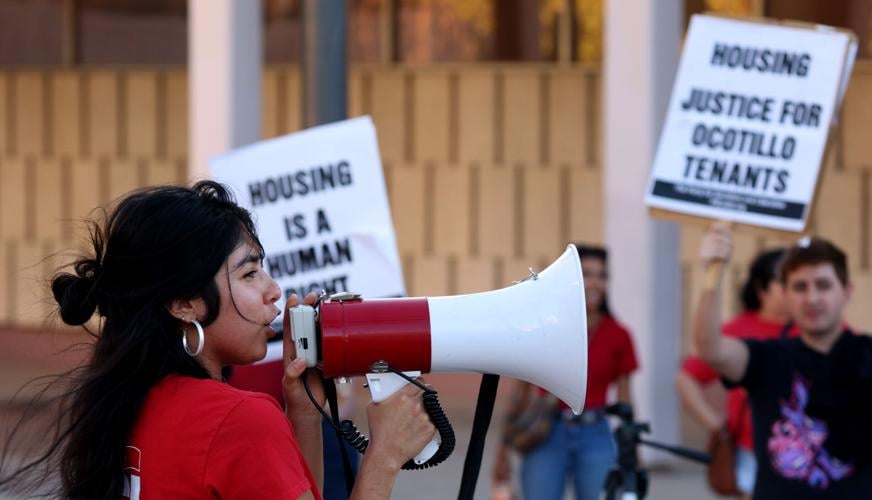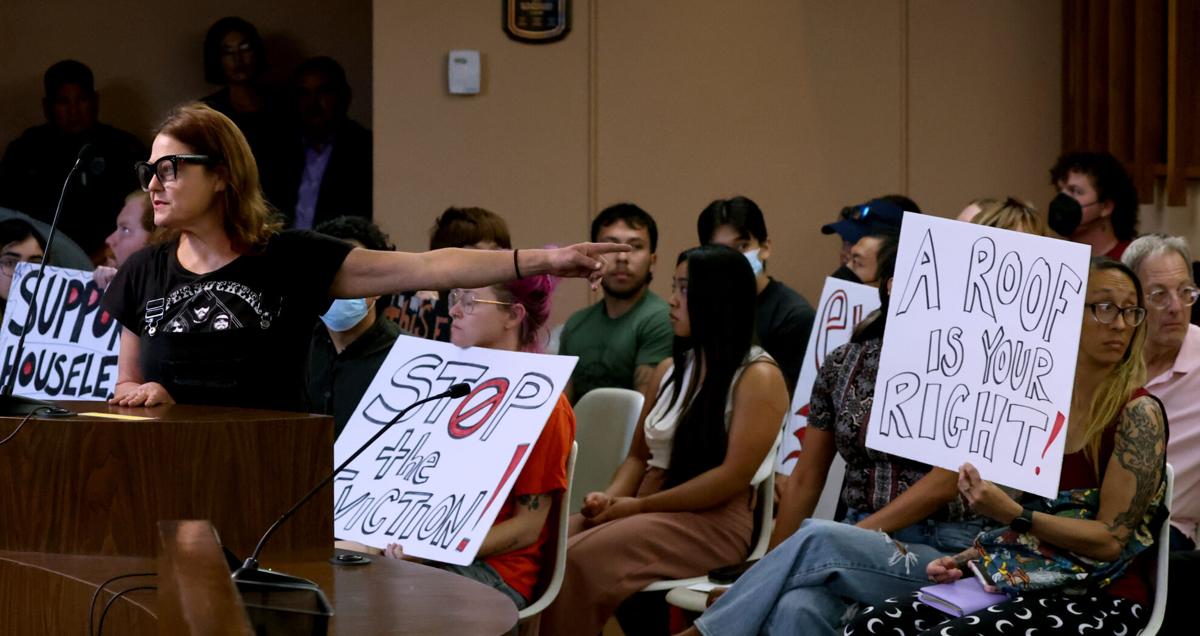Tucson City Council revisited the city’s response to the mass eviction of about 200 people from a south side hotel at its Tuesday meeting amid criticism from some mutual aid groups in the wake of the mass displacement.
Residents living at the Ocotillo Apartments and Hotel were promised food, shelter and drug addiction treatment by a furtive program called “Happy Times.” Residents reported receiving two meals a day for some time — cereal and pizza — but no other aid as the owners abandoned the residents and left the Ocotillo property owners with thousands in unpaid rent bills.
The program was a sober living home scheme, a common predatory practice where individuals promise services to vulnerable populations, especially Native Americans, and bill Medicaid for the services that aren’t provided.
Tucson reported 153 total interactions with residents: 46 accepted detox or shelter services, 21 moved in with family or friends and 14 self-paid to move into another hotel. Three residents were reported as part of the missing and murdered indigenous list and their family members were contacted, while the rest “refused resources.”
Mari Vasquez, the multi-agency resource coordinator for Tucson and Pima County, told council members that Tucson police informed her of the pending eviction of hundreds of people on Sept. 12.
While the city showed up with an abundance of resources on the day of the eviction, officials placed blame on the community advocacy groups that told residents to stay in their rooms and await an eviction order instead of accepting shelter services, which “made the situation a lot worse,” Vasquez told City Council members.
“I think they sensed that somehow, we as the city were evicting folks. They jumped on that bandwagon and went out and really were spreading misinformation to the residents,” City Manager Michael Ortega said. “We were there to try to help and to keep these folks from being evicted in terms of going into the street, to provide them services.”
Members of those same groups showed up to the City Council meeting Tuesday night to decry the mass evictions after council members discussed the situation in a study session.
“You all spoke very vehemently about the extensive coalition that was brought together to address the issues at Ocotillo,” said Luke Menke, who said he listened to the study session conversation beforehand. “But at no point in that session was it addressed whether, through all of this, a cost analysis was done of displacing the vulnerable individuals at Ocotillo compared to just paying the bill and bringing in agencies to get them the services that they needed.”
Several former Ocotillo residents also spoke at the City Council meeting about their experiences. Alyson Hodge said she was in attendance at the meeting with several of her former neighbors at Ocotillo, some of whom have been living at a camp on the side of the road that was “bulldozed” Tuesday, she said.
“We are very fortunate to have each other right now because that’s all we have,” she told council members.

Jessica Salas speaks to a handful of former Ocotillo Apartments and Hotel tenants and their supporters just before the start of a Tucson City Council meeting on Tuesday.
City Council recaps response
Several council members requested Tuesday’s item to discuss the fraudulent sober living home, and Vasquez began the conversation by reading a more than 15-minute long statement outlining the city’s response to the evictions.
The city teamed up with the state housing, economic security and Medicaid departments to coordinate a response, Vasquez said, while looping in pertinent city departments and tribal governments. Some residents took up offers for addiction treatment, behavioral health support and shelter, but “many residents refused resources at this time, saying they were not ready yet.”
The city was able to delay the property owner’s planned evictions of residents by a week and showed up with several housing resource providers on Sept. 20, the day of the final eviction notice, Vasquez said. She named more than 20 city and state departments, social service agencies and Native American tribes that were on site to provide services, but still, “some residents were not ready to accept.”
Vasquez described misinformation circulated by “protesters and advocate attorneys” that “was not based on accurate information or a realistic assessment of the challenges presented by the ongoing investigations of the criminal activities for a fraudulent sober living home,” she said.
Several community-based mutual aid groups, including Community on Wheels and Community Care Tucson, which provide aid and advocate for the homeless population, as well as the Tucson Tenants Union, were on site engaging with evictees.
Liz Casey, a social worker and volunteer with Community Care Tucson, said Vasquez didn’t provide a fair assessment of the mutual aid groups’ presence.
“Before we were at the site, many residents had already said no to those services. People weren’t not taking services, because we were there telling them not to do it. We were informing people what their rights were as tenants,” she said. “If (the city is) saying they did the best they could, then that means that we need to do much more to be able to offer people more services.”
Tucson Tenants Union members went door-to-door to tell residents they didn’t have to leave without an official court order. Many residents took up the advice to stay in the home they’d known for months and were provided a number for an attorney working on behalf of displaced Ocotillo residents.
Residents at the hotel on Sept. 20 said they feared displacement and didn’t want to be separated from their partners or pets by being placed in a temporary shelter.
Paul Gattone, an attorney helping the residents at Ocotillo who was on site the day of the evictions, said “several residents requested our legal assistance.”
“It is our position that the majority of the Ocotillo residents were tenants — not hotel guests,” Gattone said in an email. “Tenants facing eviction are entitled to eviction hearings under Arizona law. To the extent that residents refused to leave their rooms, this was in response to the management’s ‘self help’ eviction strategy of illegally boarding up doors absent a court order.”
While many decided to stay in their rooms past the final eviction notice, they were forced to leave on Sept. 29 as the property was condemned after all the hotel’s fire extinguishers and alarms were damaged or destroyed, leaving “all fire suppression mechanisms beyond repair” while “the fuses and power system were tampered with” Vasquez said. Residents reported the electricity went out that morning.
Twenty vans from Community Bridges and Old Pueblo Community Services transported residents throughout the day, according to Vasquez, while the Pima Animal Care Center helped to board dogs.

Tucson City Council member Kevin Dahl talks with former Ocotillo Apartments and Hotel tenants and their supporters before the start of the Oct. 3 meeting.
While pointing out the comprehensive steps the city took to prepare for the evictions, Tucson Mayor Regina Romero took a defensive stance against the criticism leveraged against the city by advocacy organizations that said Tucson could have done more and said they should reach out to the city for more information “in a situation as volatile and complex as this one.”
“Many times community groups act on assumptions, on misinformation, and make a difficult situation worse,” she said.
City Manager Ortega confirmed there is an ongoing investigation into the sober living home scheme that involves local, state and federal law enforcement.
Watch now: Tucson is responding to homeless encampments the community reports based on the level of danger they pose to the community. Video by Nicole Ludden/Arizona Daily Star.







